The Con
The Con
How Scams Work,
Why Youre Vulnerable,
and How to Protect Yourself
James Munton and Jelita McLeod
Rowman & Littlefield Publishers, Inc.
Lanham Boulder New York Toronto Plymouth, UK
Published by Rowman & Littlefield Publishers, Inc.
A wholly owned subsidiary of The Rowman & Littlefield Publishing Group, Inc.
4501 Forbes Boulevard, Suite 200, Lanham, Maryland 20706
http://www.rowmanlittlefield.com
Estover Road, Plymouth PL6 7PY, United Kingdom
Copyright 2011 by Rowman & Littlefield Publishers, Inc.
All rights reserved . No part of this book may be reproduced in any form or by any electronic or mechanical means, including information storage and retrieval systems, without written permission from the publisher, except by a reviewer who may quote passages in a review.
British Library Cataloguing in Publication Information Available
Library of Congress Cataloging-in-Publication Data
Munton, James, 1971
The con : how scams work, why youre vulnerable, and how to protect yourself / James Munton and Jelita McLeod.
p. cm.
Includes index.
ISBN 978-1-4422-0731-8 (cloth : alk. paper) ISBN 978-1-4422-0733-2 (electronic)
1. FraudPrevention. 2. Swindlers and swindling. I. McLeod, Jelita, 1971 II. Title.
HV6691.M86 2011
362.88dc22 2011008097
 The paper used in this publication meets the minimum requirements of American National Standard for Information SciencesPermanence of Paper for Printed Library Materials, ANSI/NISO Z39.48-1992.
The paper used in this publication meets the minimum requirements of American National Standard for Information SciencesPermanence of Paper for Printed Library Materials, ANSI/NISO Z39.48-1992.
Printed in the United States of America
Acknowledgments
E ach story in this book represents an untold number of victims. These experiences, though extraordinarily painful, will serve to help many more, and we are appreciative to the individuals represented within. We are grateful to all those whose contributions helped make this book possible. David Fugate of Launch Books was instrumental in shaping the book from the outset with his guidance and insight. Special thanks to Detective Michael B. Dana, who gave generously of his time and expertise and who continues to fight the good fight against swindlers and con artists. Thank you also to Glenn Hester, another law enforcement comrade, and security specialist Marta Zaricznyj, who provided us with extremely helpful feedback. Julie Dimmick was there for us before the book was even written, and her professional and personal perspectives were invaluable throughout the process. Alex Mitchell read an early draft of the book, and his comments motivated and energized us. Thanks go to Helen Chang, Sandra Park, and Ircka West for allowing us to tap their brains and/or call upon their services. Above all, we thank our families, whose love, patience, advice, and support sustain us.
Scams 101
Admitting Theres a Problem
W hen I tell you that it started with a glass of wine at a Christmas party, you may think you know where the storys going. I can tell you for a fact that youre wrong.
Scott had a good working relationship with his boss, Nick, who was also owner and founder of the company where they worked. The two men were close in age and agreed on most aspects of the business. Scott never doubted that Nick was a talented entrepreneur and straight shooter.
We work in a small office, says Scott. Nick decided to have the company holiday party at his place. He had this neat bachelor pad in the city. During the party, I spilled a little wine on my shirt and I wanted to clean up, so I went into the bathroom. I looked around to see if I could find something to dab my shirt with. There was a cabinet with towels and washcloths on one shelf, and on the second, higher shelf was a collection of prescription bottles. And it really was a collection, maybe 20 or 30 bottles. I was taken aback, because Id never known Nick to be sick. I did think it was a lot of medicine, but I also thought it was none of my business. As I was about to close the door, I took one more look up there and something caught my eye.
Scott thought he saw something familiar on one of the pill bottles. To satisfy his curiosity, he took it down and was stunned to find his own name on the label.
It was very, very weird. The prescription was for Vicodin, which Ive never taken. I grabbed another bottle. It had some other persons name on it, not Nicks. It was also for Vicodin. I ended up taking them all down. I found seven bottles with my name on them. There were prescriptions for Xanax, OxyContin, and other things Id never heard of. I didnt know what to think. It didnt make any sense to me. Obviously there was something screwy going on, but I still didnt get why or how he would have these prescriptions in my name. So I looked at the name of the pharmacy on one of the bottles and decided to ask the pharmacist there. Then I put everything back on the shelf, went back out to the party, and tried to act normal.
What Scott discovered when he visited the pharmacy the next day was that someone, presumably Nick, had been filling prescriptions in his name for over a year. Scott contacted his insurance company, which verified that the prescriptions had been processed through his insurance policy. At first, Scott didnt know what to do with this information.
I was completely blindsided. It was just such an odd thing to happen. I always liked Nick. He was a good boss. Obviously he had some kind of problem, and he had appropriated my identity to get these pills, which was without a doubt illegal and definitely immoral. But if I turned him in to the police, what would it mean for my job? He was not only my boss; he was the owner of the company.
Scott discussed the dilemma with his wife, who advised him to call the police. Instead, Scott decided to try confronting Nick first, thinking that if his boss was abusing drugs, the discussion might serve as a wake-up call.
Nick tried pleading ignorance at first, but I had seen the evidence with my own eyes. Then he began to get emotional. He was all teary eyed and apologetic, said it was all a big mistake, promised he would never do it again. I took him at his word.
Scott thought he and Nick had come to an acceptable resolution. His job and the company were unaffected. When Scott went back to the insurance company, though, he found clearing up the confusion more difficult than he had anticipated. As far as the insurance company was concerned, Scott had been prescribed and had purchased the drugs in question. Without a written admission from Nick that he had
stolen Scotts identification, there was no reason to think otherwise. The prescriptions were now included in Scotts medical records as part of his medical history. During one of the many phone conversations he had with insurance representatives, Scott wondered aloud how Nick had come by those prescriptions in the first place. Had a real doctor prescribed them? And if so, had the doctor known Nicks real identity?
The customer rep said that, worst-case scenario, Nick had gone into a doctors office as me and had been treated and prescribed as me. Or he could have falsified a prescription. It seemed like the further I got into it, the more convoluted it got. But I was still willing to give him the benefit of the doubt, right up until I got a call from the pharmacy asking for Davy, my three-year-old son.
Con men and women vary in approach, motivation, and experience. Some are professional, long-time scam artists. Others have fallen into the con game as a result of circumstance and are not as practiced. They may have taken up a life of crime to support a drug habit. They may project an image of wealth and refinement. They may be aggressive or smooth talking or both. A conner may look like the girl next door or the scary hitchhiker from a horror movie. There is no way to know just by looking.

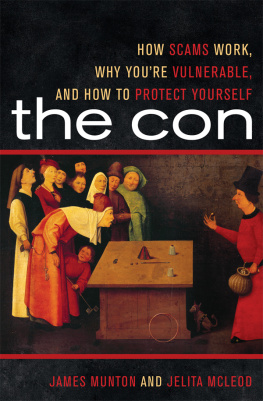
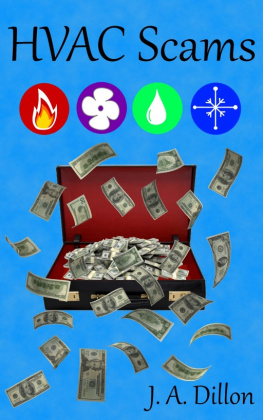
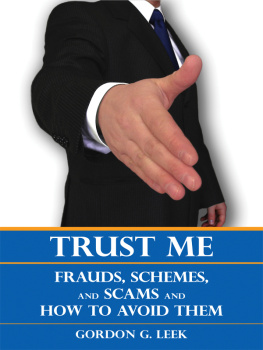
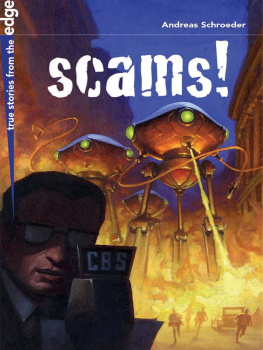
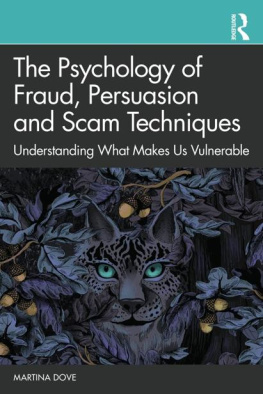

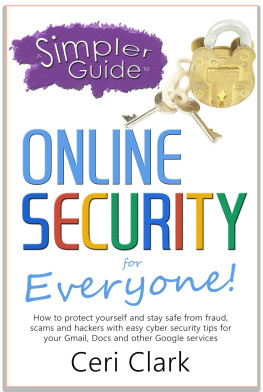

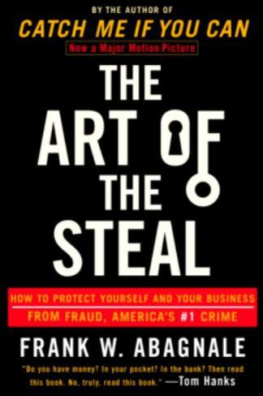
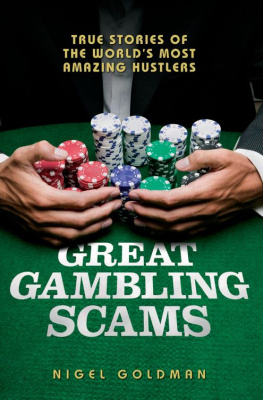
 The paper used in this publication meets the minimum requirements of American National Standard for Information SciencesPermanence of Paper for Printed Library Materials, ANSI/NISO Z39.48-1992.
The paper used in this publication meets the minimum requirements of American National Standard for Information SciencesPermanence of Paper for Printed Library Materials, ANSI/NISO Z39.48-1992.